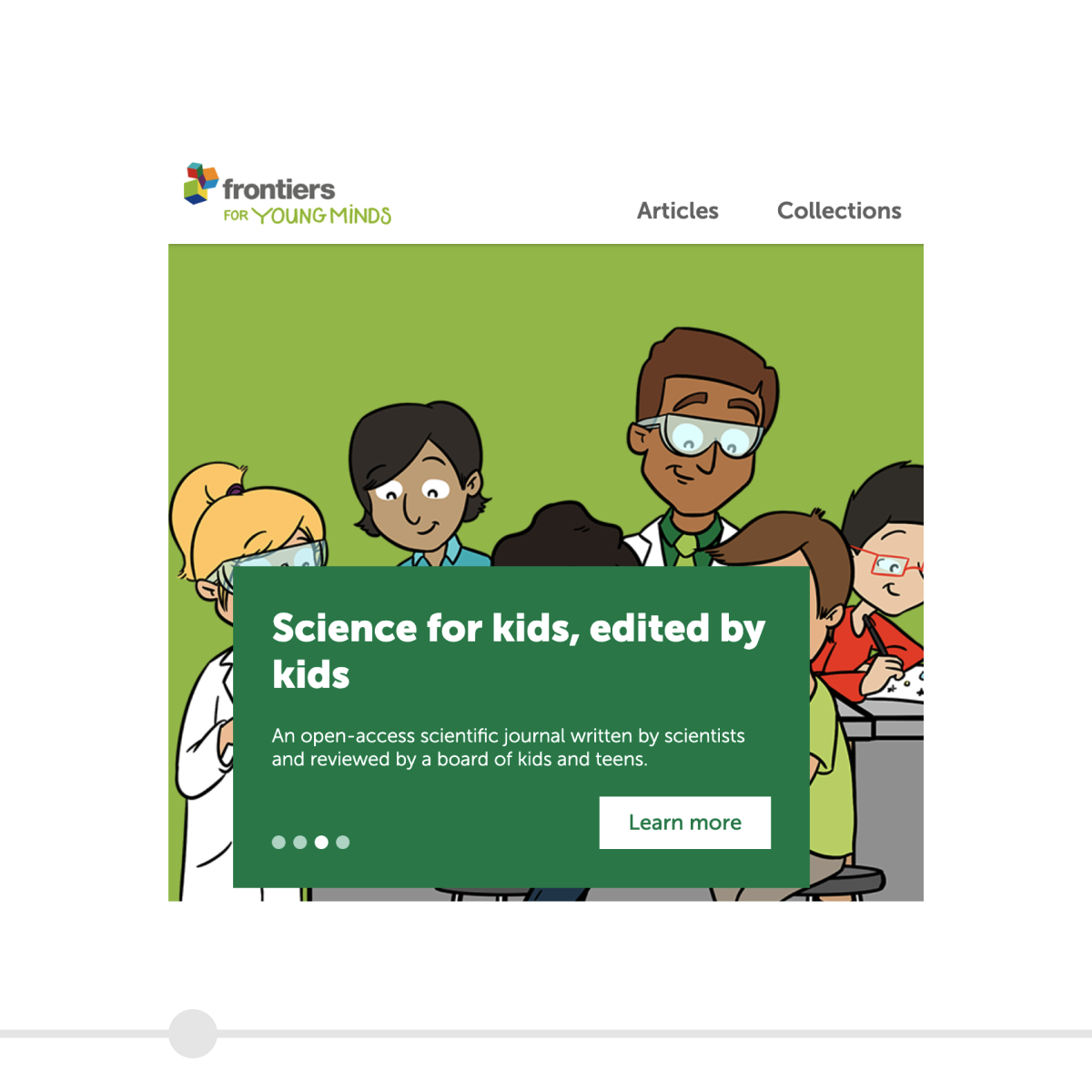
Press office
2022
About
Frontiers is the 3rd most-cited and 6th largest research publisher with a mission to accelerate scientific discovery by making science open.
Founded in 2007 by Kamila Markram and Henry Markram, two neuroscientists from the Swiss Federal Institute of Technology (EPFL) in Switzerland, Frontiers places the researcher at the center of everything they do and enables the research community to develop the solutions needed to live healthy lives on a healthy planet. Featuring custom-built technology, artificial intelligence, and rigorous quality standards, Frontiers’ research articles have been viewed more than 1.9 billion times, reflecting the power of research that is open for all.
Key facts
-
![]()
3rd most-cited publisher
with an average of 5.5 citations per article
-
![]()
330,000 quality research articles
freely available worldwide
-
![]()
1.9 billion article views and downloads
with 519 million in 2021
-
![]()
202,000 editors and 1.2 million authors
from leading institutions around the world
-
![]()
163 journals
across 1,165 academic disciplines
-
![]()
8 national agreements
and 10 consortia partnerships, providing services to 620+ individual institutions
-
![]()
1,600+ employees
in 14 locations across Europe, North America, and Asia, representing 62 nationalities with 62% women
Spokespeople
Kamila Markram, PhD
Co-founder and Chief Executive Officer
Kamila co-founded Frontiers with the vision to make research openly and widely available for the benefit of humanity. Winner of various entrepreneurial and innovation awards, she frequently speaks on Open Science topics at world renowned events and venues, including the National Academy of Sciences, Science Foo Camp, TEDx, Web Summit, ESOF, GESDA and alike.
-
Kamila completed her Master’s thesis at the Max-Planck Institute for Brain Research in Frankfurt and obtained her Master’s in Psychology at Technical University Berlin in 2003, followed by the PhD in Neuroscience at the EPFL in Switzerland in 2006. During her postdoctoral studies at the EPFL, she co-developed the “Intense World Theory of Autism”, proposing that autism results from a “super-charged” brain that perceives, absorbs and feels too much causing autistic people to withdraw from an overly intense world. The theory has been widely featured in popular science magazines and documentaries and published as a book in 2018.
Frederick Fenter, PhD
Chief Executive Editor
Fred supervises Frontiers’ journal portfolio and is directly involved in all strategic projects. He served as a publishing consultant during Frontiers’ launch phase, re-joining in 2013 in his current role. An active advocate for Open Science, Fred frequently organizes and participates in a variety of advocacy events and roundtables.
-
Fred earned a PhD in Chemistry from Harvard and continued his research on atmospheric compounds at the CNRS in France and EPFL in Switzerland. He moved into academic publishing in 1997, first overseeing a portfolio of journals, book series and major reference works at Elsevier Science and then founding FontisMedia, a publishing technology start-up that developed the first multi-language content-management platform for scientific journals. He was also technology advisor for the launch of an institutional document repository InfoScience and consulted for the founding of the English-language EPFL Press.
Timeline
Media citations
151,000+
Frontiers’ articles featured by international news outlets including The New York Times, The Guardian and BBC World News
Antarctic life
A study published in Frontiers in Marine Science revealed the discovery of a colony of sponges and other animals attached to a boulder on the seafloor –challenging researchers' understanding about the existence of life in extreme environments.
The Guardian, 15 Feb 2021
Pharaoh unwrapped
For the first time since the 11th century BCE, scientists have unwrapped – virtually, using CT scans – the only royal mummy to remain unopened in modern times, pharaoh Amenhotep I. The findings were published in Frontiers in Medicine.
BBC, 28 Dec 2021
Reducing plastic
A study published in Frontiers in Bioengineering and Biotechnology revealed that bacteria found in cow stomachs can be used to digest polyesters used in textiles, packaging, and compostable bags.
CNN, 2 July 2021
Precious Earth
Only between 2% and 3% of the Earth’s terrestrial surface can be considered ecologically intact, according to a study published in Frontiers in Forests and Global Change. However, a focus of restoration of specific species in intact habitat could recover ecological integrity to about 20% of land.
News Scientist, 15 April 2021
Anxiety and exercise
The findings of a study published in Frontiers in Psychiatry found that those who engage in regular exercise may lower their risk of developing anxiety by almost 60%.
Forbes, 12 September 2021
Tiny robots
A study in Frontiers in Robotics and AI is the first to investigate how tiny robots might perform as drug delivery vehicles in neural tissue.
WEF, 5 September 2021
Frontiers for Young Minds (FYM) is a
unique, completely free, open access kids' science journal that publishes articles written by top researchers and edited by children aged 8-15.
The journal features 800 articles with more than 15 million views and downloads, produced by 2050 authors, 3850 young reviewers and 680 science mentors. FYM publishes in six subject areas (Astronomy and Physics, Biodiversity, Earth & its Resources, Human Health, Mathematics, Neuroscience & Psychology) with materials available in English, Hebrew and Arabic. In 2021, the Nobel Collection, featuring articles written by the Noble Prize winners, was launched and has received over 410,000 page views to-date.
Frontiers in Science is Frontiers’ flagship, multidisciplinary open access journal focused on transformational science to accelerate solutions for healthy lives on a healthy planet.
Launching in 2022, the journal publishes a limited number of well-curated, peer-reviewed scientific articles of remarkable quality (20 to 25 per year) from exceptional scientists, by invitation only, on game-changing science and paradigms. Editorial themes include: Human health and wellbeing; Climate change; Ecology and biodiversity; Urban development ; Food, water and energy systems; Revolutionary developments in technologies; Transformative role of social and economic sciences.
Frontiers Forum runs as a series of speaker sessions, where Nobel Laureates and other leading scientists showcase and discuss scientific advances with an invited audience of the world’s top researchers, policymakers, and innovators.
In 2021, the Forum hosted 24 incredible speakers, including such renowned names as Al Gore, Axel Cleeremans, Kongjian Yu, Esther Duflo, Harris Lewin and David Christian. More than 21,000 of the world’s leading minds from 159 countries joined the discussions, which have been viewed online by more than 6 million people.

Frontiers Policy Labs initiative seeks to strengthen the connection between robust scientific research and informed policymaking.
Traditional labs facilitate a controlled environment for research and experimentation, for trial and error, measurement, observation, and practice. That is what Frontiers aims to achieve through Policy Labs - an environment where global experts and thought leaders can discuss and strengthen the dialogue between science and policy.
In 2021, Policy Labs featured 5 podcasts, 4 evidence snapshots, 5 commentaries and 5 video conversations with experts on a variety of topics from climate change evidence to covid vaccine efficacy and safety to strengthening the role of science in policymaking, open science, big data, global research and funding.
Frontiers builds all their technology in-house and is known as a fast, efficient, powerful and highly scalable open science platform, customized for the needs of authors, editors, reviewers, and readers.
The Artificial Intelligence Review Assistant (AIRA) is an industry-first and has the potential to revolutionize how manuscripts are evaluated. AIRA currently makes up to 20 recommendations in seconds, from assessing language quality and the integrity of figures to detecting plagiarism and potential conflicts of interest. In 2021, AIRA introduced new checks to validate the papers’ quality, including image manipulation and potentially fraudulent detection, as well as an improved scope classifier. Also, Frontiers’ authors, editors, and reviewers are now supported by a Live Chat feature.
Media contacts
For general media inquiries, please contact: publicrelations@frontiersin.org
For media enquires related to research, please contact: press@frontiersin.org
To subscribe to Frontiers' newsletter, please fill in this form.















































